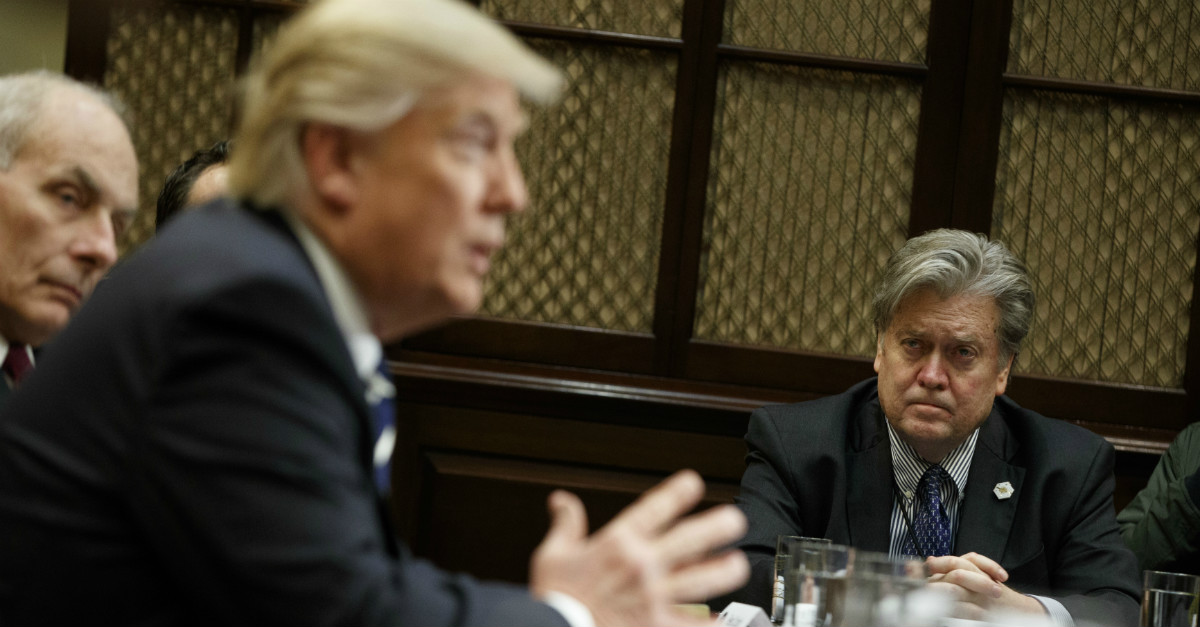To whatever extent there is an ideological core to the Trump administration, it can be found in Steven K. Bannon’s interviews. The former executive chair of alt-right outlet Breitbart has been eager to navel-gaze about the Trump administration’s historical contribution to the American project with any audience eager to hear his perspective.
Videos by Rare
At the Conservative Political Action Conference (CPAC), he described President Donald J. Trump’s policy agenda as “economic nationalism” in a radical departure from the free market rhetoric of his Republican colleagues. As it turns out, this despise of libertarian ideals was not a fluke comment. In a conversation with New York Times Magazine’s Robert Draper released this week, Bannon has harsh words for both sides of the aisle… with an awkward allusion to the Cato crowd:
“I think the Democrats are fundamentally afflicted with the inability to discuss and have an adult conversation about economics and jobs, because they’re too consumed by identity politics. And then the Republicans, it’s all this theoretical Cato Institute, Austrian economics, limited government — which just doesn’t have any depth to it. They’re not living in the real world.”
RELATED: Libertarians are flexing their political muscle
At first glance, this may seem like simply a dismissive comment from a presidential aide with little real life consequences. Yet, in the context of modern history, it marks a major theoretical shift in how a Republican president sees the world.
Although they were three very different men, Ronald Reagan, George H. W. Bush, and George W. Bush all embraced a conservative philosophy that Americans are all too familiar with. I’m speaking about the ideas of free markets, cutting spending, “drowning government in a bathtub,” and the like.
As President Reagan once said, “If you analyze it, I believe the very heart and soul of conservatism is libertarianism.”
Sure, legitimate arguments can be made that the action of each of these three men did not match reality. For all their talk about small government, Reagan expanded the drug war, H. W. infamously raised taxes despite a campaign promise, and W. launched the War on Terror.
Nonetheless, their embrace of the rhetoric of small government had real-life policy consequences… even if they weren’t applied consistently. Reagan lowered the top income tax rate from 70 to 28 percent and oversaw a decade of prosperity. The effect was so magnanimous that even Democratic President Bill Clinton felt compelled to declare, “The era of big government is over.”
RELATED: Saudi Arabia gushes over Donald Trump for all the wrong reasons
That’s not to say that the cult of small government has been uninterrupted since Reagan. As I noted at Rare back in 2015, Barack Obama marked a transformative change for the Democratic Party, embracing a more progressive ideology than many of his more liberal contemporaries.
Nevertheless, Bannon’s quick dismissal of “theoretical Cato Institute, Austrian economics, limited government” ideas is very new and very scary for a Republican. Remember, this is a man with an ear of the president.
If small government is just pie-in-the-sky talk for Trump’s right-hand man, it’s going to be a very rough four years for partisan Republicans who actually believe in shrinking government.



